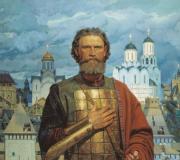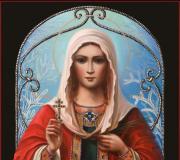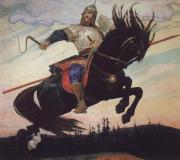Is it possible to agree with the idea of the critic Pisarev that Pavel Kirsanov is a hero of the Pechorin type. Pavel Petrovich – “Pechorin of small sizes”
The heroes of Lermontov and Turgenev - Grigory Aleksandrovich Pechorin and Pavel Petrovich Kirsanov - are people belonging to the same social group, but living in different time. After the massacre of the Decembrists in 1825, the time came for the generation about which M. Yu. Lermontov wrote: “... the cowardly is shameful before danger and despicable slaves before power...” This is not said about all the young and mature - Pechorin can and should be spoken of as extraordinary personality, like a very interesting person. This is how M. Yu. Lermontov shows it when he draws unusual portrait Pechorin, talks about his actions, about his friendship with Dr. Werner, about only love Pechorin to Vera Litovskaya, about the hero’s desire to find his place in life. You may or may not like Pechorin, but you cannot remain indifferent to him. The hero appeals to some with his straightforwardness, but offends others; some like his sincerity, while others see cruelty in it. Two or three episodes from the life of the hero M. Yu. Lermontov remain in the reader’s memory as an example of the hero’s honesty and decency, for example, an explanation with Princess Mary, and a duel with Grushnitsky, when Pechorin gives a person a chance to admit his mistakes and avoid a duel. But in the scene of farewell to Maxim Maksimych - cold, cruel - it seems that no one likes Pechorin, and rightly so.
There is essentially nothing to say about Pavel Petrovich Kirsanov... Pose is a very short description of his behavior. But there are points that deserve the reader's attention. In his dispute with Bazarov, Pavel Petrovich is right when he asserts that life, with its ready-made, historically grown forms, can be smarter individual person or groups of persons. Pavel Petrovich reproaches Bazarov for contempt for the people, the nihilist parries the reproach: “Well, if he deserves contempt!” Kirsanov talks about Schiller and Goethe, Bazarov exclaims: “A decent chemist is twenty times more useful than any poet!” etc. But if Pavel Petrovich comes to belittling the human personality in front of accepted principles, then Bazarov asserts his own personality at the cost of destroying authorities.
Pavel Petrovich's youth passed in the 1830s in an atmosphere of mute reaction, mature years coincided with the period of the “dark seven years”. He fails to understand the requirements new era, views younger generation are deeply alien to him. As Turgenev wrote: “Look into the faces of the “fathers” - weakness and lethargy or limitation.” Pavel Petrovich considers himself a liberal and a lover of progress. He talks a lot about the public good, but Bazarov is right when he tells him: “... you respect yourself and sit with your hands folded; What is the use of this? All of Pavel Petrovich’s principles boil down to one thing: to protect the old order.
Do these people – Pechorin and Pavel Petrovich – have anything in common? What allowed D.I. Pisarev to compare Pavel Petrovich Kirsanov with Pechorin “ small size"? First of all, I think, character traits: selfishness, conceit, indisputability in judgments, manner of dressing, behavior in society... In matters of principle, one should not, one simply cannot compare Pavel Petrovich with Pechorin.
At the end of the novel, I. S. Turgenev, talking about P. P. Kirsanov’s stay in Dresden, seems to put an end to this comparison: “...between two and four o’clock, at the most fashionable time for a walk, you can meet a man about fifty years old... elegantly dressed... This is Pavel Petrovich. Here he gets acquainted more with the British and with visiting Russians, in conversation with whom he gives free rein to his bile... He doesn’t read anything Russian, but on his desk there is a silver ashtray in the shape of a peasant’s bast shoe. It's still making noise..."
That's all. In the preface to the novel “Hero of Our Time,” M. Yu. Lermontov offered the reader the following observation: “The history of the human soul, at least petty soul, almost more curious and not more useful than history a whole people." This can be attributed to Pechorin, but not to Pavel Petrovich Kirsanov, I am not interested in him. So judge: does the elder Kirsanov look like “little Pechorin”? No, of course not! With all due respect to the judgments of Dmitry Ivanovich Pisarev...
(No Ratings Yet)
- “This book has recently experienced the unfortunate gullibility of some readers and even magazines... Others were terribly offended... that such an immoral person was given as an example to them...
- 1 “What, Peter? Can’t you see it yet?” asked on May 20, 1859, going out without a hat onto the low porch of the inn... a gentleman in his early forties...
- About the hero: the public received him with irritation. Some because they set such an immoral person as an example, others because the author supposedly drew his own...
- M. Yu. Lermontov worked on the novel “A Hero of Our Time” in 1838-1840. The idea was born during the writer’s exile to the Caucasus in 1838....
- In every book, the preface is the first and at the same time last thing; it either serves as an explanation of the purpose of the essay, or as a justification and response to critics. But...
- I Nikolai Petrovich Kirsanov, sitting on the porch, awaits the arrival of his son Arkady at the inn. Nikolai Petrovich owned an estate, his father was a military general, and he himself...
- The most wonderful works Russian literature of the 19th century centuries are distinguished by the formulation of the most important social, philosophical, ethical issues of their time. The wealth of issues is one of the main qualities characteristic of...
- Bela The author travels from Tiflis on crossroads and on the way meets staff captain Maxim Maksimych. The men stop in the village to spend the night, and things start between them...
- The material of the article is taken from the book by B. I. Turyanskaya and L. N. Gorokhovskaya “Russian literature XIX B. Materials for preparing for exams” M., “ Russian word”. 2002....
- Turgenev's novel “Fathers and Sons” was written in 1861. He was immediately destined to become a symbol of the era. The author especially clearly expressed the problem of the relationship between the two...
- Option 1 A wonderful gift to see and feel what is happening in Russian public life possessed by I. S. Turgenev. Your understanding of the brewing main social conflict of the 60s of the XIX century... I look sadly at our generation! Its future is either empty or dark, Meanwhile, under the burden of knowledge and doubt, It will grow old in inaction. M....
- Valentin Rasputin was born on March 15, 1937 in Irkutsk region, in the village of Ust-Uda. Nature, which became close in childhood, will come to life and speak in books. In big...
The heroes of Lermontov and Turgenev - Grigory Aleksandrovich Pechorin and Pavel Petrovich Kirsanov - are people belonging to the same social group, but living in different times. After the massacre of the Decembrists in 1825, the time came for the generation about which M. Yu. Lermontov wrote: “... the cowardly is shameful before danger and despicable slaves before power...” This is not said about all the young and mature - it can also be said about Pechorin should be spoken of as an extraordinary personality, as a very interesting person. This is how M. Yu. Lermontov shows him when he draws an unusual portrait of Pechorin, talks about his actions (the kidnapping of Bela, the duel with Grushnitsky), about his friendship with Doctor Werner, about Pechorin’s only love for Vera Litovskaya, about the hero’s desire to find his place in life . You may or may not like Pechorin, but you cannot remain indifferent to him. The hero appeals to some with his straightforwardness, but offends others; some like his sincerity, while others see cruelty in it. Two or three episodes from the life of the hero M. Yu. Lermontov remain in the reader’s memory as an example of the hero’s honesty and decency, for example, an explanation with Princess Mary, and a duel with Grushnitsky, when Pechorin gives a person a chance to admit his mistakes and avoid a duel. But in the scene of farewell to Maxim Maksimych - cold, cruel - it seems that no one likes Pechorin, and rightly so.
There is essentially nothing to say about Pavel Petrovich Kirsanov... Pose is a very short description of his behavior. But there are points that deserve the reader's attention. In his dispute with Bazarov, Pavel Petrovich is right when he asserts that life, with its ready-made, historically grown forms, can be smarter than an individual or a group of people. Pavel Petrovich reproaches Bazarov for contempt for the people, the nihilist counters the reproach: “Well, if he deserves contempt!” Kirsanov talks about Schiller and Goethe, Bazarov exclaims: “A decent chemist is twenty times more useful than any poet!” etc. But if Pavel Petrovich comes to belittling the human personality in front of accepted principles, then Bazarov asserts his own personality at the cost of destroying authorities.
Pavel Petrovich's youth passed in the 1830s in an atmosphere of mute reaction; his mature years coincided with the period of the “gloomy seven years.” He is unable to understand the demands of the new era; the views of the younger generation are deeply alien to him. As Turgenev wrote: “Look into the faces of the “fathers” - weakness and lethargy or limitation.” Pavel Petrovich considers himself a liberal and a lover of progress. He talks a lot about the public good, but Bazarov is right when he tells him: “... you respect yourself and sit with your hands folded; What is the use of this? All of Pavel Petrovich’s principles boil down to one thing: to protect the old order.
Do these people - Pechorin and Pavel Petrovich - have anything in common? What allowed D.I. Pisarev to compare Pavel Petrovich Kirsanov with Pechorin of “small size”? First of all, I think, character traits: selfishness, conceit, indisputability in judgments, manner of dressing, behavior in society... In matters of principle, one should not, one simply cannot compare Pavel Petrovich with Pechorin.
At the end of the novel, I. S. Turgenev, talking about P. P. Kirsanov’s stay in Dresden, seems to put an end to this comparison: “... between two and four o’clock, at the most fashionable time for a walk, you can meet a man about fifty... elegantly dressed... This is Pavel Petrovich. Here he gets acquainted more with the British and with visiting Russians, in conversation with whom he gives free rein to his bile... He doesn’t read anything Russian, but on his desk there is a silver ashtray in the shape of a peasant’s bast shoe. He's still making noise..."
That's all. In the preface to the novel “A Hero of Our Time,” M. Yu. Lermontov offered the reader the following observation: “The history of the human soul, even the smallest soul, is perhaps more interesting and useful than the history of an entire people.” This can be attributed to Pechorin, but not to Pavel Petrovich Kirsanov, I am not interested in him. So judge: does the elder Kirsanov look like “little Pechorin”? No, of course not! With all due respect to the judgments of Dmitry Ivanovich Pisarev...
The heroes of Lermontov and Turgenev - Grigory Alexandrovich and Pavel Petrovich - are people belonging to the same social group, but living at different times. After the massacre of the Decembrists in 1825, the time came for the generation about which M. Yu. Lermontov wrote: “... the cowardly is shameful before danger and despicable slaves before power...” This is not said about all the young and mature - about Pechorin it can also be said should be spoken of as an extraordinary personality, as a very interesting person. This is how M. Yu. Lermontov shows him when he draws an unusual portrait of Pechorin, talks about his actions (the kidnapping of Bela, the duel with Grushnitsky), about his friendship with Doctor Werner, about Pechorin’s only love for Vera Litovskaya, about the hero’s desire to find his place in life . You may or may not like Pechorin, but you cannot remain indifferent to him. The hero appeals to some with his straightforwardness, but offends others; some like his sincerity, while others see cruelty in it. Two or three episodes from the life of the hero M. Yu. Lermontov remain in the reader’s memory as an example of the hero’s honesty and decency, for example, an explanation with Princess Mary, and a duel with Grushnitsky, when Pechorin gives a person a chance to admit his mistakes and avoid a duel. But in the scene of farewell to Maxim Maksimych - cold, cruel - it seems that no one likes Pechorin, and rightly so.
There is essentially nothing to say about Pavel Petrovich Kirsanov... Pose is a very short description of his behavior. But there are points that deserve the reader's attention. In his dispute with Bazarov, Pavel Petrovich is right when he asserts that life, with its ready-made, historically grown forms, can be smarter than an individual or a group of people. Pavel Petrovich reproaches Bazarov for contempt for the people, the nihilist parries the reproach: “Well, if he deserves contempt!” Kirsanov talks about Schiller and Goethe, exclaims: “A decent chemist is twenty times more useful than any poet!” etc. But if Pavel Petrovich comes to belittling the human personality in front of accepted principles, then Bazarov asserts his own personality at the cost of destroying authorities.
Pavel Petrovich's youth passed in the 1830s in an atmosphere of mute reaction; his mature years coincided with the period of the "gloomy seven years." He is unable to understand the demands of the new era; the views of the younger generation are deeply alien to him. As Turgenev wrote: “Look into the faces of the “fathers” - weakness and lethargy or limitation.” Pavel Petrovich considers himself a liberal and a lover of progress. He talks a lot about the public good, but Bazarov is right when he tells him: “... you respect yourself and sit with your hands folded; what good does that do?” All of Pavel Petrovich’s principles boil down to one thing: protect the old one.
Do these people - Pechorin and Pavel Petrovich - have anything in common? What allowed D.I. Pisarev to compare Pavel Petrovich Kirsanov with Pechorin of “small size”? First of all, I think, character traits: selfishness, conceit, indisputability in judgments, manner of dressing, behavior in society... In matters of principle, one should not, one simply cannot compare Pavel Petrovich with Pechorin.
At the end of the novel, I. S. Turgenev, talking about P. P. Kirsanov’s stay in Dresden, seems to put an end to this comparison: “... between two and four o’clock, at the most fashionable time for a walk, you can meet a man about fifty... elegantly dressed... This is Pavel Petrovich. Here he knows more with the English and with visiting Russians, in conversation with whom he gives free rein to his bile... He doesn’t read anything Russian, but on his desk he has a silver an ashtray in the shape of a peasant's bast shoe. It's still noisy..."
That's all. In the preface to the novel “A Hero of Our Time,” M. Yu. Lermontov offered the reader the following observation: “The history of the human soul, even the smallest soul, is perhaps more interesting and useful than the history of an entire people.” This can be attributed to Pechorin, but not to Pavel Petrovich Kirsanov, I am not interested in him. So judge: does the elder Kirsanov look like “little Pechorin”? No, of course not! With all due respect to the judgments of Dmitry Ivanovich Pisarev...
How to download free essay? . And a link to this essay; Pavel Petrovich - “Pechorin of small sizes.” Do you agree with this statement by D.I. Pisarev? (based on the novels “Hero of Our Time” by M. Yu. Lermontov” and “Fathers and Sons” by I. S. Turgenev”) is already in your bookmarks.
quoted1 > > Pavel Petrovich - “Pechorin of small sizes.” Do you agree with this statement by D.I. Pisarev? (based on the novels “Hero of Our Time” by M. Yu. Lermontov” and “Fathers and Sons” by I. S. Turgenev”)Additional essays on this topic
The heroes of Lermontov and Turgenev - Grigory Aleksandrovich Pechorin and Pavel Petrovich Kirsanov - are people belonging to the same social group, but living at different times. After the massacre of the Decembrists in 1825, the time came for the generation about which M. Yu. Lermontov wrote: “... the cowardly is shameful before danger and despicable slaves before power...” This is not said about all the young and mature - about Pechorin it can also be said should be spoken of as an extraordinary person, as
I. S. Turgenev worked on the novel “Fathers and Sons” in the early 60s of the 19th century. The novel reflects the processes taking place in Russia at this time: the struggle between the socio-political forces of liberals and revolutionary democrats. The heroes of the novel are representatives of two ideological camps: liberal Pavel Petrovich Kirsanov and revolutionary democrat Yevgeny Bazarov. Evgeny Bazarov is young, energetic, businesslike. He takes nothing for granted and denies any principles. According to his worldview, he is a materialist, a person who went through school
The nature of the conflict in the novel is based primarily not on age, but on social contradictions. In the 60s of the 19th century, two trends appeared in the public life of Russia: democrats-raznochintsy and liberals. The nature of the struggle between these currents is reflected in the work. Novel ( immortal work) has a special composition: it is built in the form of dialogue and political disputes. There are 28 chapters in total, and final chapter serves as an epilogue, and all chapters follow one after another according to the principle “for” and
Kirilla Petrovich Troekurov is one of the main characters in A. S. Pushkin’s novel “Dubrovsky”. This is an old Russian gentleman. Thanks to his wealth and fame, he felt superior to all his neighbors in the province. Kirilla Petrovich loved to organize lavish evenings with riotous fun. No one could ever dare to refuse the master's offer, for fear of angering him. He, in turn, was pleased with the flattery lavished on him by his guests. The master never missed an opportunity to show off his
I. S. Turgenev, according to his contemporaries, had a special instinct for guessing the emerging movement in society. In the novel “Fathers and Sons” Turgenev showed the main social conflict 60s of the 19th century - a conflict between liberal nobles and democratic commoners. The basic principle of constructing a novel is antithesis; and this is already evident from the title of the novel, in which two generations seem to be contrasted: the older and the younger. But in the novel itself, the conflict is not of an age, but of an ideological nature, i.e.
They are the best of the nobles - and that is why they were chosen by me to prove their inconsistency. I. S. Turgenev Into the alarming, complete dramatic events time has come best work I. S. Turgenev - novel "Fathers and Sons". The world was splitting apart. As a true artist, Turgenev was faithful to the truth of life, showing the confrontation between the outdated and the new, emerging. The Kirsanovs are not the worst representatives of the nobles. Their father is a military general, a participant in the War of 1812. Semi-literate himself, he gave the best education for his children at that time.
I think the critic is right in his assessment. Turgenev deliberately emphasized the image of Bazarov with the help of dialogues. Disputes provide an opportunity to gain deeper understanding life principles characters. The main opponent of the hero is retired officer Kirsanov. The author confronts two extremes in the novel - a nihilist and an aristocrat, showing the need to find a golden mean.
Pavel Petrovich is about 45 years old.
He was born at the same time as Lermontov, his personality was formed in the 30s, in an atmosphere that gave birth to “superfluous” people like Pechorin. This is probably what an aged Lermontov hero would look like. In his youth, Pavel Petrovich was also characterized by skepticism, bile, “proud contempt” and seething “in empty action.” Drawing the image of Kirsanov, Turgenev notes that he was self-confident and mocking; brilliant career, But fatal love changed the fate of the nobleman.
The novel is permeated with ideological disputes. Compositionally in artistically The scene of the argument between the heroes in the tenth chapter is important. Pavel Petrovich proves: only empty and immoral people can live without “principles.” It is necessary to be guided by clear rules, even if they have become obsolete. Evgeniy Vasilyevich retorts that “principle” is a meaningless foreign word. In response to Kirsanov’s contempt for the people, Bazarov straightforwardly explains his attitude towards the ignorant peasant: “Well, if he deserves contempt!”
The author is attracted to the hero’s open radicalism by the lack of pretense, contempt for pompous phrases and impulse towards practical matters. Evgeniy is strong in denouncing Kirsanov’s conservatism, in criticizing the idle talk and lordly effeminacy of Russian liberals. He rightly notes that Pavel Petrovich is operating with clever words, but sits idly by.
The resolution of the ideological dispute occurs only in the 24th chapter, which tells of a duel between opponents. This episode was a natural consequence of the development of the plot. After the duel, Kirsanov Sr. confesses to his brother: “I’m starting to think that Bazarov was right when he reproached me for aristocracy.” In his opinion, it’s time for middle-aged people to stop breaking down and think about society; they need to put vanity aside.
At the end of the novel, Turgenev pronounces his verdict on conservatism, describing how Pavel Petrovich moistened his forehead with cologne and lay down: “... his emaciated head lay on a white pillow, like the head of a dead man... Yes, he was a dead man.” This sentence is the final point in the dispute between old and new, which was set by the author himself.
Effective preparation for the Unified State Exam (all subjects) -




